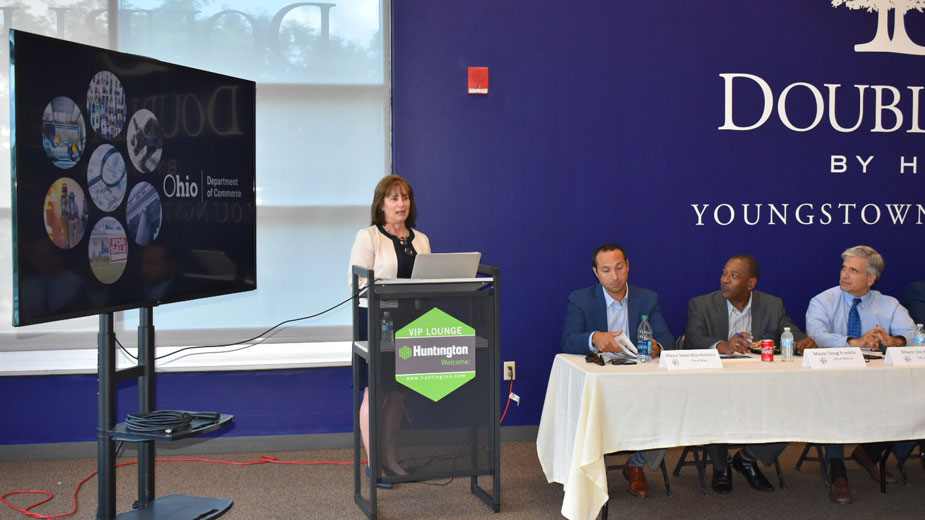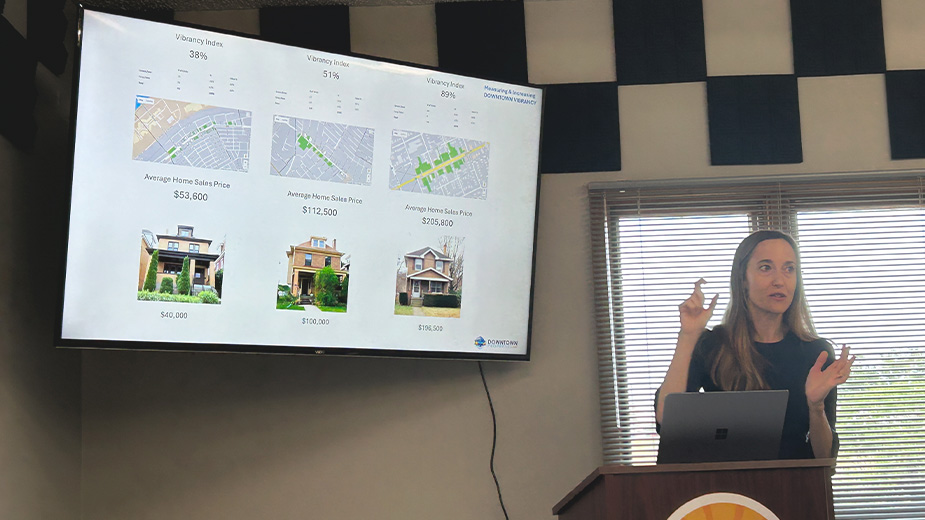Marijuana, Unclaimed Funds: Ohio Commerce Director Briefs Mayors
YOUNGSTOWN, Ohio – Only half of the roughly 57,000 Ohioans who are eligible to access medical marijuana as of this year have done so due to delays in getting dispensaries up and running, said the director of the Ohio Department of Commerce, Sheryl Creed Maxfield.
Maxfield, a native of Struthers, was the featured speaker at a meeting of the Mahoning River Corridor Mayors Association, held Friday at the Covelli Centre.
From August 1984 to last December, she worked in the state attorney general’s office, where she served under eight attorneys general, starting with Anthony Celebrezze Jr. and including Ohio’s current governor, Mike DeWine.
“There is not a state agency that I have not represented,” she told the assembled mayors and their guests.
DeWine was surprised when he asked Maxfield what role she wanted to play in his administration and she responded that she wanted to head the commerce department, she recalled. The main reason was the diversity of the work; her office’s divisions are financial services, industrial compliance, liquor control, real estate and professional licensing, securities, the state fire marshal and unclaimed funds.
“If there’s a black hole in state government where they put all the stuff that doesn’t fit with anything else, it’s there,” she said. “We are routinely gifted with programs and issues that no other department has, but that’s what makes it fun.”
Oversight of portions of Ohio’s new medical marijuana program – a role the attorney general shares with two other state agencies – was one such “gift” from the state legislature three years ago, she said. Her office oversees cultivation facilities, processing operations and testing labs.
As of July, 53,082 patients and 3,998 caregivers are registered to access medical marijuana products, but only 30,248 have made purchases, according to current statistics. The reason is just half of the approved dispensaries are open.
“A lot of people don’t want to drive two or three hours,” she said.
Not all of the approved cultivators or testing labs are open as well, and the reasons are “all over the block,” she said.
“We’ve seen all kinds of things,” she pointed out. One Level II cultivator was ready to begin work and the city he was dealing with adopted a “not in my backyard” stance and changed the applicable regulations. The cultivator had to move across the street, out of the city’s jurisdiction, and had to wait for the state to amend is rules before proceeding.
Among the roles of the department’s financial services division is oversight of Ohio’s chartered banks and credit unions, Maxfield said.
Home Savings Banks is one of the largest state-chartered banks and will move up further when it becomes a federally chartered bank. All of the local state chartered institutions are “very strong,” she said. Operational issues typically seen are with very small banks, such as ones that opened as a family bank and continue to operate that way.
The securities division oversees the more than 200,000 licensed professionals in Ohio, a number she attributed to Ohio being “uniquely situated” between Chicago and New York.
“Right now the big issues for all banks, all money holders, is cybersecurity, to make sure that the funds that they have or are responsible for are not capable of being corrupted in some way,” she said.
The alcohol control division is the one Maxfield is asked about most, she continued. Sales last year were at $1.2 billion, a number that continues to grow. That increase is driven by sales of high-end alcohol as the economy improves, she said.
The division also handles licensing of bars, restaurants and other sellers of spirits.
“Here’s the thing: We’re really bad at it. It takes us nine months to transfer a liquor permit,” she said. She blamed using the same system that was in place “when Prohibition died” for the lengthy processing time.
This year, the state is spending $5 million on upgrades so that license transfers can be done online, hopefully getting transfers down to 30 days or less.
The unclaimed funds division had its best performance last year in reuniting people with their money, $136 million, but Ohio is still sitting on $3 billion in funds that doesn’t belong to the state, and takes in another $300 million each year.
When Maxfield started the job, she said she asked Akil Hardy, superintendent of the unclaimed funds division, what outreach he did in Youngstown.
“He gave me an interesting response: He said we should do more because we get a lot of claims in Youngstown,” she recalled. “I said, ‘Canfield Fair.’ ”
As a result, the division will be set up at the fairgrounds Wednesday, the first day of the fair. “We’ll grab as many as we can, but anybody who has a computer can access” the online records, she said.
She also shared disappointing news with the mayors: she had already looked up their names and none had unclaimed funds personally. However, several of their cities had unclaimed funds, she reported.
Friday’s meeting also featured an update on dam removal projects on the Mahoning River.
Lowellville Mayor James Iudiciani told the group that equipment was on site and he expected approval to move forward from the U.S. Army Corps of Engineers to proceed.
Joann Esenwein, director of planning at Eastgate Regional Council of Governments, reported that the dam removal project in Struthers was funded and city officials were working with the design-build team to get contracts signed. Youngstown is working with its consultant to prepare an application for funding that is due this month.
Eastgate is also working with environmental regulators to resolve issues regarding the dams in Trumbull County before the time comes to submit applications for that work.
The meeting concluded with a walking tour of the nearby Youngstown Foundation Amphitheatre.
Warren Mayor Doug Franklin, whose city built its own amphitheater several years ago, joked with his Youngtown counterpart, Jamael Tito Brown, that “Good mayors borrow, great mayors steal.”
Cities “don’t have the luxury of not using best practices,” Franklin added.
Pictured: Ohio Department of Commerce director and Struthers native Sheryl Creed Maxwell was the featured speaker at the Friday meeting of the Mahoning River Corridor Mayors Association
Copyright 2024 The Business Journal, Youngstown, Ohio.



